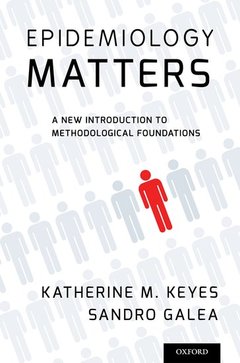Description
Epidemiology Matters
A New Introduction to Methodological Foundations
Authors: Keyes Katherine M., Galea Sandro
Language: English
Subject for Epidemiology Matters:
Approximative price 77.68 €
In Print (Delivery period: 21 days).
Add to cart
Publication date: 08-2014
256 p. · 15.9x23.4 cm · Paperback
256 p. · 15.9x23.4 cm · Paperback
Description
/li>Biography
/li>
Epidemiology Matters offers a new approach to understanding and identifying the causes of disease -- and with it, how to prevent disease and improve human health. Utilizing visual explanations and examples, this text provides an accessible, step-by-step introduction to the fundamentals of epidemiologic study, from design to analysis. Across fourteen chapters, Epidemiology Matters teaches the individual competencies that underlie the conduct of an epidemiologic study: identifying populations; measuring exposures and health indicators; taking a sample; estimating associations between exposures and health indicators; assessing evidence for causes working together; assessing internal and external validity of results. With its consequentialist approach -- designing epidemiologic studies that aim to inform our understanding, and therefore improve public health -- Epidemiology Matters is an introductory text for the next generation of students in medicine and public health.
Katherine M. Keyes, PhD, is Assistant Professor of Epidemiology at Columbia University. Her research focuses on life course epidemiology with particular attention to psychiatric disorders, including cross-generational cohort effects on substance use, mental health, and chronic disease. She has particular expertise in the development and application of novel epidemiological methods, and in the development of epidemiological theory to measure and elucidate the drivers of population health. Sandro Galea, MD, DrPH, is Chair of the Department of Epidemiology at Columbia University. His work focuses on the social production of health of urban populations, innovative cells-to-society approaches to population health, and advancing a consequentialist approach to epidemiology in the service of population health. He is a past president of the Society for Epidemiologic Research and an elected member of the Institute of Medicine of the National Academies of Science.
© 2024 LAVOISIER S.A.S.
These books may interest you

Modern Epidemiology 101.20 €



